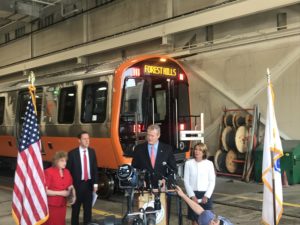
Gov. Charlie Baker addresses reporters at the MBTA's Wellington maintenance yard in front of a new Orange Line train in July 2019. Photo courtesy of the Office of Gov. Charlie Baker.
A day after the association representing Kendall Square’s biggest employers and stakeholders declared a “state of emergency” over the state of the MBTA, Gov. Charlie Baker offered up a plan to speed up repairs on the transit system, which were previously planned to take 13 years.
Baker, Lt. Gov. Karyn Polito, Transportation Secretary Stephanie Pollack and MBTA General Manager Steve Poftak gathered at the Orange Line’s Wellington maintenance facility Tuesday morning to unveil the plan, which focuses on more aggressively attacking the transit system’s maintenance backlog using more evening and weekend closures of rail lines, $50 million for more inspections and to support repair work and a team charged with both expediting work on infrastructure upgrades and smoothing the disruptions they cause.
“The MBTA has made tremendous gains since the winter of 2015 to control its operating costs, strengthen the pipeline to design and build capital projects, and take steps to improve service by focusing investments on core system infrastructure,” Baker said in a statement. “In order to capitalize on that progress, this acceleration plan will allow the T to continue its investments at a faster pace, with greater focus on service improvements to provide a safe, reliable means of transportation that supports our economy, and gets people where they need to go.”
“Given the current landscape of MBTA repairs, we are confident these five initiatives will sharpen the MBTA’s focus on delivering construction projects and service improvements for riders,” Pollack said in a statement. “While we understand executing on this plan will likely cause additional inconveniences for our customers now, these measures will allow us to get to the MBTA that they deserve sooner.”
To minimize disruption to its riders, the T typically saves critical work on its subway lines for overnight hours; however, this limits how fast projects can be completed. The plan Baker released Tuesday stated the authority will increase the number and length of shutdowns through 2020.
Baker’s plan included a push to increase maintenance and inspections to catch the kinds of problems that may have caused this month’s catastrophic Red Line derailment. T investigators say a previously undiscovered fault with the derailed subway car itself may have caused the incident. The governor also pledged to seek legal changes necessary to use “innovative financing and project delivery approaches” like contract bids that include both construction cost and the project’s schedule and the ability to designate an on-call contractor for projects costing less than $500,000 like station repair and maintenance.
To smooth the increased disruption the plan will cause, Baker said the T will get $50 million more in operating funds to stand up a team aimed at expediting maintenance and capital projects. The team will include extra shuttle bus drivers to ferry passengers during maintenance projects, more inspectors and consultants to mentor MBTA staff as they develop “data-driven strategies and best practices for inspections and maintenance.”
The day before Baker’s announcement, Kendall Square Association President C.A. Webb issued an open letter to the governor saying the Red Line derailment had shown the system to be in a “state of emergency” and called Poftak’s projection that the MBTA won’t be able to finish all repairs until 2032 “simply unacceptable.”
“After decades of underinvestment in our transit system, it is time for all of us to step up,” she wrote. “We need to shift how we think about transportation in Massachusetts – we should be asking ‘how do we build a transportation system that grows our economy?’ We need to make critical system improvements like the Red-Blue Connector and West Station [in Allston]. … It is time to raise revenue for transportation and end this crisis.”






